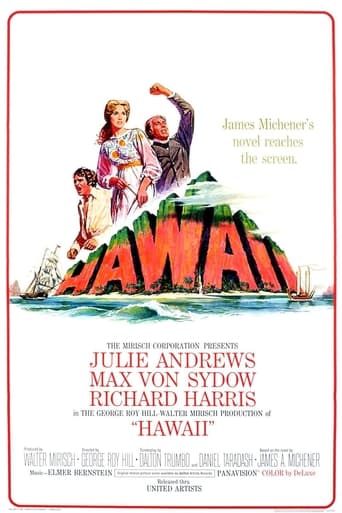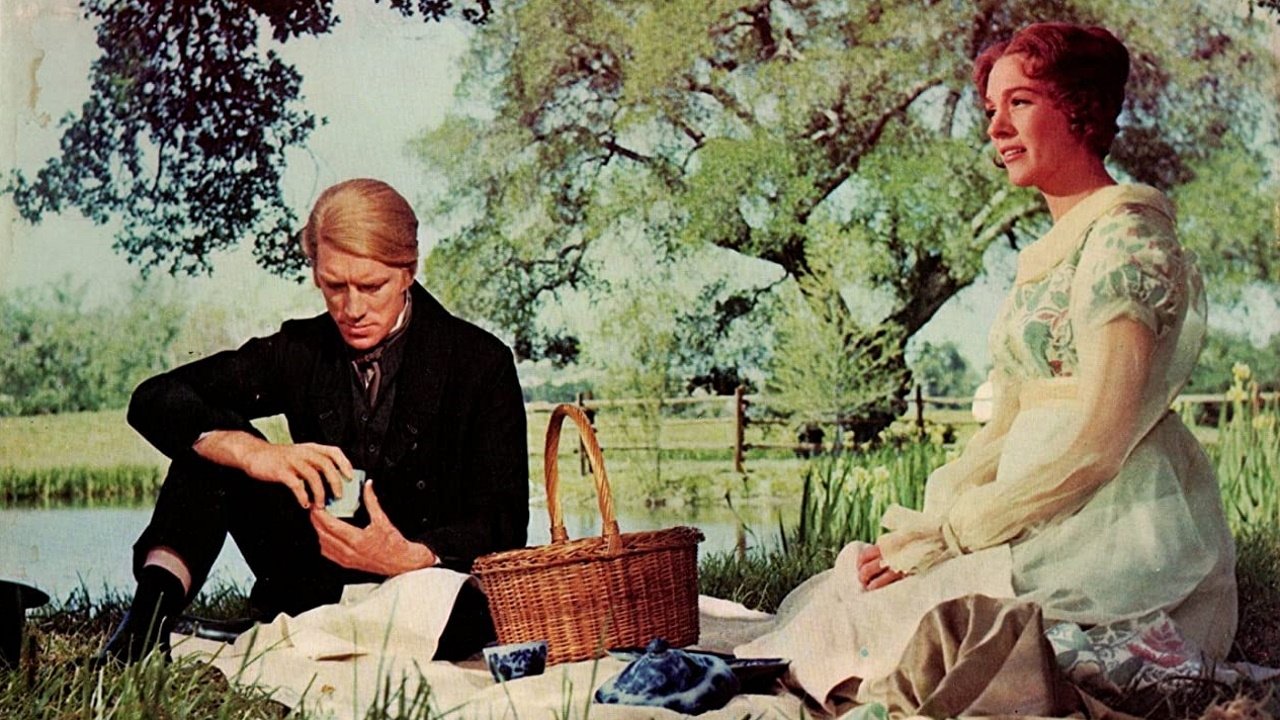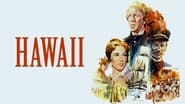Steffi_P
By this point, the mid-1960s, the old-style biblical epics had more or less died out completely, but epics of other kinds were still reasonably popular. This story of missionaries in the first half of the 19th century, adapted from a James A. Michener novel and made a year before the abandoning of the Hollywood production code, is in fact a polemic against rigid adherence to Christian scriptures. At its centre is an overly pious and sometimes hypocritical preacher, the kind of mind which would have believed in all those unswervingly self-righteous bible flicks of the previous decade.But Hawaii is not some flagrant and roughshod denunciation of church and faith. The picture was adapted (quite liberally) from its source by acclaimed screenwriters Daniel Taradash and Dalton Trumbo, and it has in particular Trumbo's tendency to treat all his characters with respectful and human portrayals, in spite of what antagonisms they may have towards each other. Thus while Max von Sydow is seen at turns as a callous fanatic, a trumped-up fool and a general negative influence, we first see him as a shy yet well-meaning youngster, clumsily trying to woo Julie Andrews. In these early scenes he is somewhat endearing figure, and even though most viewers will not condone much of what he later does, this first impression sticks with us, preventing us from completely despising him and allowing us to believe in his wife's devotion to him.Max von Sydow was an excellent choice for this role. Admittedly his Swedish accent is a bit of a non-sequitur, but he is perfect at bringing out both the sympathetic young lad and the unshakable preacher. His performance occasionally seems to border on the hammy, but this is acceptable because it fits in with his strength of character and the earnest manner with which he takes up his ministerial duties. Julie Andrews is great too. After having made her name with the more or less fantasy figures of Mary Poppins and Maria von Trapp there's a strange kind of poignancy seeing her suffer the strains of being a more realistic wife and mother. She seems sadly underused here however, although apparently she was the main victim of the cuts in the edited version I have, which is a real pity. Richard Harris and Gene Hackman bring their forceful presences to make some of the more powerful statements in the dialogue, while Jocelyn LaGrande makes a terrific impact with her full-of-life performance. Although she spoke no English and learned her lines phonetically, it's incredible the way she communicates meaning and emotion around those words.Hawaii was the first large-scale picture directed by George Roy Hill, and by and large he handles the broad canvas well. Of note is that fact that he gives a constant life and rhythm to the island, often featuring a few figures working in the background or framing a character with gently swaying foliage. Hill was of course a child of the New Wave and this is evident in the occasional zoom or whip pan, but his touch is generally quite light and minimalist. Unlike some of the other younger directors around at this time he favours long takes with few close-ups. The only trouble with this is doesn't seem to quite have developed the knack of subtly making a point within the frame, sometimes using the camera to force our attention on something. An example is when Iliki runs to greet Richard Harris's ship, throwing off her western dress, a moment which seems rather contrived and clunky by the way the camera pans down onto the discarded garment.Hawaii is a far from perfect picture, being neither quite the stunning extravaganza that epics are generally meant to be, nor the stirring human drama it also seems to aspire to. However, it has many moments which come close to both goals, and most importantly has a very honest humanity to it – something so many epics lack – and this allows it to speak its message directly without ever threatening to alienate its audience.
Jim Colyer
Max von Sydow pops up in this story of missionaries who went to Hawaii in the 1820s. It is really the story of his wife, Jerusha, who pines away in the island paradise. Jerusha is played by Julie Andrews, whom I never really cared for, although she was highly regarded in the 1960s. Von Sydow took on a similar role in 1971 in The Emigrants, a film in which he again uproots his wife only to watch her disintegrate. A young Richard Harris is Jerusha's jilted lover. Themes are typical. We watch native Hawaiians suffer as a result of contact with Europeans. The film is a bit too long, but it is worthwhile. I rented it when I decided to go to Hawaii.
ftgplus4
I saw this on TV many years ago and thought it was one of the worst movies I'd ever seen. I was surprised later to find out that it had not been universally panned -- quite the opposite in fact.What stood out to me about this movie was not its epic sweep or lovely visuals. It was the fact that each and every character was absurdly one-dimensional. This film is not populated by people, but by pawns. Each character is driven by one thing, and sees that one thing as if with tunnel vision. The story is nothing but a contrived orchestration of those clashing motivations.On another note, this movie could be said not to be fair to Christians. (Imagine a Hollywood movie not being fair to Christians -- unheard of!) But the message I'd get out of it (though I'm sure this wasn't the intended message) is: It's good to want to reach people with the truth, but there are definitely wrong ways to go about it.
bkoganbing
From the day Captain Cook arrived on those beautiful islands, Hawaii like Poland was cursed because of geography. Poland situated between two gigantic European powers just became a pawn in the eternal military and diplomatic chess game.Hawaii located where it is between North America and the Orient, when sea travel improved it was only a matter of time before the big powers came a-callin'. And they came from both directions. Not shown in the time frame this film covers, but soon after, waves of Japanese and Chinese immigrants landed on the shore. Hawaii was coveted by all and America got it.Max Von Sydow plays a young New England minister out to bring the gospel to the heathen as he sees them and has been taught to see them. His church won't send him out to the south seas without a wife, lest he be tempted by sins of the flesh, so on a short acquaintance he marries Julie Andrews. She in turn has been home pining away for whaling captain Richard Harris. When Von Sydow and Andrews get to Hawaii over the course of their story Harris would reappear.Naturally its quite a culture shock for the New Englanders when they get to Hawaii. The film's story covers about a quarter of a century of Hawaiian history and the history of the changing attitudes of Andrews and Von Sydow. James Michener's original novel was of War and Peace duration and I suppose the final script was as best they could get it and cover what he was trying to convey. Despite the obvious racist feelings that Von Sydow has, he's a basically decent man who does do some positive good.His problem is that everything with him has to be filtered through the Bible. There's a lot of incest going on in Hawaii when he lands there. Reason being is that these are islands with a limited number of mating partners. Now incest is bad as we know because it does eventually weaken the gene pool. But Von Sydow hardly takes a scientific approach, how could he, he doesn't know it, he hasn't been taught it.Julie Andrews is a far cry from the perky Mary Poppins. She develops quite an attachment to Hawaii and its people and her approach with them is fundamentally different than her husband's. It's not a bad performance.Richard Harris is the lusty whaling captain of Andrews previous affections. I tend to think his part might have been edited down. In a recent biography of Harris, it was stated he and Andrews did not get along at all on the set. Harris in those days was a whole lot like the characters he played like this one in Hawaii.Of course when you've got Hawaii as a subject for a camera, the photography could not be anything but gorgeous.Hawaii covers a period not well known to most Americans except Hawaiians. And indeed they are Americans and have been since 1959. I think people could learn something from this film even with the script flaws.



 AD
AD




